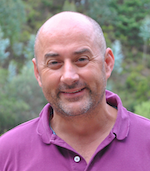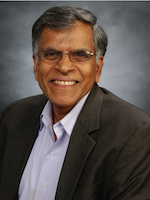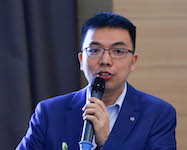LabVIEW is a powerful engineering tool for industry, research and academia. It has a long history of innovation and it continues to build on the foundational concepts of virtual instrumentation introduced over 30 years ago.
LabVIEW’s interactive graphical programming environment makes it easier to build measurement applications. The tight integration between the software and the measurement hardware gives unparalleled visibility to both code and signals which enables rapid prototyping of new systems, and efficient incremental enhancement of existing systems.
A broad range of measurement applications benefit from these capabilities including those in industry, research and teaching. Arming students with powerful tools like LabVIEW can inspire them, help them learn more effectively, and better prepare them for entering industry.
Measurement systems are becoming more complex all the time. It is not unusual for them to contain multiple distributed processors and FPGAs and I/O nodes. Taming this complexity will require continued innovation in the tools we use— innovations that raise the level of visibility and abstraction to increase our productivity as we design these systems. Graphical representation of components and interconnections will play a key role in these higher levels of abstraction, and LabVIEW is leading the way.
 Jeffrey Kodosky co-founded National Instruments in 1976 and served as the company’s vice president of research and development until he was named an NI Business and Technology Fellow in 2000. Popularly known as “the father of LabVIEW”, he holds over 60 patents associated with the LabVIEW software technology and he was inducted into the Electronic Design Engineering Hall of Fame for his invention.
Jeffrey Kodosky co-founded National Instruments in 1976 and served as the company’s vice president of research and development until he was named an NI Business and Technology Fellow in 2000. Popularly known as “the father of LabVIEW”, he holds over 60 patents associated with the LabVIEW software technology and he was inducted into the Electronic Design Engineering Hall of Fame for his invention.
Kodosky has maintained a close connection to academia over the years. He is a member of the Board of Trustees of Rensselaer Polytechnic Institute. He also serves on the University of Texas at Austin College of Natural Sciences Advisory Council, the UTeach Advisory Council, the UT Physics Department Advisory Council, and an Advisory Group at Southwest Texas State University's Math Department.
In 1999, Kodosky received the University of Texas College of Natural Sciences Hall of Honor Award and the Rensselaer Alumni Association Fellows Award. He was also recognized with the Woodrow Wilson Award for Corporate Citizenship. In 2018, he received the RAA Distinguished Service Award as well as the RPI Presidential Lifetime Achievement Award. In 2019, he was inducted into the National Inventors Hall of Fame.
Kodosky earned his bachelor's degree in physics from Rensselaer Polytechnic Institute in 1970.
In 1996, 25 years ago, C. Bohus, B. Atkan, L. Crowl and M. H. Shor published two works in IFAC and in IEEE Trans. On Education entitled “Running control engineering experiments over the Internet” and “Distance learning applied to control engineering Laboratories”. It is time to celebrate Remote Experimentation.
Remote experimentation is part of Technology Enhanced Learning and is a multifaceted field of research. Different points of view and different groups of interest can be taken into consideration. First of all, technology is the pillar of remote experimentation, but the remote laboratory has to follow teachers’ pedagogical requirements and convince policy makers and other stakeholders of its utility and usability. Are research groups meeting these requirements? Are remote labs being used in universities, schools and companies? Do we have companies in remote experimentation?
The past and the present, the opportunities and the challenges of remote experimentation will be addressed in the keynote.
The keynote will be based on the book “Remote Laboratories: Empowering STEM Education with Technology” to be published by World Scientific Publishers in February 2021.
 Javier García-Zubía is professor in the Faculty of Engineering of the University of Deusto, Spain. His research fields are remote experimentation and the design of VHDL/FPGA systems. He is director of the WebLab-Deusto research group (included in Deustek Research Group) which has been developing remote laboratories for over 15 years. He has published hundreds of works in books, conferences and journals and has co-edited three books on remote experimentation with the University of Deusto. He has been a partner in national, European and international projects supported by FP7, H2020, Erasmus+, NSF, etc. He has been a speaker at several national and international conferences and has also received awards from various institutions and associations.
Javier García-Zubía is professor in the Faculty of Engineering of the University of Deusto, Spain. His research fields are remote experimentation and the design of VHDL/FPGA systems. He is director of the WebLab-Deusto research group (included in Deustek Research Group) which has been developing remote laboratories for over 15 years. He has published hundreds of works in books, conferences and journals and has co-edited three books on remote experimentation with the University of Deusto. He has been a partner in national, European and international projects supported by FP7, H2020, Erasmus+, NSF, etc. He has been a speaker at several national and international conferences and has also received awards from various institutions and associations.
 Gustavo R. Alves graduated in 1991 and obtained an MSc and a PhD degree in Computers and Electrical Engineering in 1995 and 1999, respectively, from the University of Porto, Portugal. He lectures at the Department of Electrical Engineering, School of Engineering, Polytechnic of Porto, since 1994, where he now holds a position as Associate Professor. He serves as the Head of the Centre for Innovation in Engineering and Industrial Technology (CIETI), an R&D unit supported by the Portuguese National Agency for Science & Technology (FCT).
Gustavo R. Alves graduated in 1991 and obtained an MSc and a PhD degree in Computers and Electrical Engineering in 1995 and 1999, respectively, from the University of Porto, Portugal. He lectures at the Department of Electrical Engineering, School of Engineering, Polytechnic of Porto, since 1994, where he now holds a position as Associate Professor. He serves as the Head of the Centre for Innovation in Engineering and Industrial Technology (CIETI), an R&D unit supported by the Portuguese National Agency for Science & Technology (FCT).
He has authored or co-authored +260 publications, including book chapters and conference and journal papers with a referee process, and also co-edited 2 books. He was involved in 19 national & international research projects. His research interests include engineering education and remote laboratories.
He served as President of the Portuguese Society for Engineering Education (2018-2020) and currently serves as Vice-President of the International Association for Online Engineering (IAOE). He also serves as an Associated Editor for the IEEE Transactions on Learning Technologies and the IEEE Latin-American Learning Technologies Journal (IEEE-RITA).
Digitalization is one of today's engines for technological trends and new development. The acquisition, normalization and evaluation of data are an essential prerequisite for the implementation of automated actions and reactions for the automatic control of production - across locations and worldwide.
The added value of this data is demonstrated at Phoenix Contact, for example in the in-house Manufacturing Solutions. Using Assisted and Augmented Reality during maintenance and assembly of complex injection molds, information like hot runner channels, heating and cooling circuits, the optimal tool temperature and the necessary assembly steps are displayed. Production and process information are retrieved directly at the machine and information customized to the respective user is provided.
 After finishing his studies in Environmental Sciences, specializing in process engineering, Mr. Rohde completed his PhD at the Bauhaus University Weimar in 2009. During this he investigated in the fields of infrastructural process engineering and computational fluid dynamics simulations (CFD).
After finishing his studies in Environmental Sciences, specializing in process engineering, Mr. Rohde completed his PhD at the Bauhaus University Weimar in 2009. During this he investigated in the fields of infrastructural process engineering and computational fluid dynamics simulations (CFD).
From 2011, Mr. Rohde headed the sales department of B + B Anlagentechnik and was responsible among other things for plant concepts and international customer service.
Since 2016 he is working for PHOENIX CONTACT GmbH & Co. KG, in the Unit Manufacturing Solutions where he is responsible for the Process Development in the context of digitization as well as augmented and virtual reality for enterprise-wide applications.
During the past year, technology has played a major role in making engineering education in the huge number of institutions in India more inclusive and resilient. Some of these initiatives existed prior to COVID due to India’s strength in information technologies. The challenges posed by the pandemic in the past year have accelerated efforts in the use of remote and virtual technologies. Dr. Vedula will discuss some of these initiatives by the Government as well by IUCEE (Indo Universal Collaboration for Engineering Education) and outline the future potential as well as challenges. The overall vision is to empower engineering graduates with the knowledge, skills and attitudes to address the Grand Challenges facing the world and address the UN Sustainable Development Goals.
 Krishna Vedula is Founder and Executive Director, IUCEE (Indo Universal Collaboration for Engineering Education) and Dean Emeritus, Francis College of Engineering, University of Massachusetts Lowell, USA. Prof. Vedula is now based in India after 40 years as an engineering educator in the US. He has been the President of IFEES (International Federation for Engineering Societies) from 2010 to 2012. He now devotes fulltime to IUCEE, with the objective of improving quality and global relevance of engineering education in India with the assistance of a global network of industry and academic experts. During the past 12 years, IUCEE has catalyzed transformations in engineering education in more than 100 institutions all over India
Krishna Vedula is Founder and Executive Director, IUCEE (Indo Universal Collaboration for Engineering Education) and Dean Emeritus, Francis College of Engineering, University of Massachusetts Lowell, USA. Prof. Vedula is now based in India after 40 years as an engineering educator in the US. He has been the President of IFEES (International Federation for Engineering Societies) from 2010 to 2012. He now devotes fulltime to IUCEE, with the objective of improving quality and global relevance of engineering education in India with the assistance of a global network of industry and academic experts. During the past 12 years, IUCEE has catalyzed transformations in engineering education in more than 100 institutions all over India
In order to study the latest development of smart tourism, we chose to start with China's smart scenic spots. Because of the rapid development of China's smart scenic spots this year, it has been applied in many aspects. In addition, by consulting the Chinese papers and academic materials of all the smart scenic spots, combined with the latest policies, online engineering, artificial intelligence and big data technology, we get the basic status of smart scenic spots. At the same time, in order to further elaborate the application of smart scenic spots and smart tourism, we make a comprehensive analysis of smart scenic spots based on some scenic spot cases, intelligent algorithms and related service equipment in China. Finally, we summarize the smart tourism and smart scenic spots in China. The research also has reference significance for remote engineering, smart city and so on.
 Prof. Dr. Gabriel Xiao-Guang Yue is the Rector Advisor of European University Cyprus and College Advisor of RICE, RMUTR, Thailand. He is the Co-Founder and Executive Director of International Engineering and Technology Institute (IETI, including 6 Nobel Prize Laureates, 2 Turing Award Laureates, 1 Fields Medal Laureate, 2 Wolf Prize Laureates). He is a Foundation Fellow of IETI, Fellow of Pakistan Academy of Engineering and Foreign Member of Georgian Academy of Natural Sciences. His research, spanning intelligent information processing, safety engineering, risk management and sustainability, has resulted numerous publications in refereed International journals, proceedings and book chapters, and many invitations as keynote speakers and Committee Members at international conference. In terms of enterprise applications, his team focuses on the strategic layout of big data and artificial intelligence, optimize the core competitiveness of companies.
Prof. Dr. Gabriel Xiao-Guang Yue is the Rector Advisor of European University Cyprus and College Advisor of RICE, RMUTR, Thailand. He is the Co-Founder and Executive Director of International Engineering and Technology Institute (IETI, including 6 Nobel Prize Laureates, 2 Turing Award Laureates, 1 Fields Medal Laureate, 2 Wolf Prize Laureates). He is a Foundation Fellow of IETI, Fellow of Pakistan Academy of Engineering and Foreign Member of Georgian Academy of Natural Sciences. His research, spanning intelligent information processing, safety engineering, risk management and sustainability, has resulted numerous publications in refereed International journals, proceedings and book chapters, and many invitations as keynote speakers and Committee Members at international conference. In terms of enterprise applications, his team focuses on the strategic layout of big data and artificial intelligence, optimize the core competitiveness of companies.
The growing automation in all aspects of life is increasing the importance for contemporary engineers to be versed in robotics and systems knowledge. We will show you how students can grasp the fundamentals of embedded systems, electromechanical concepts, and Internet of Things using the TI-RSLK MAX kit. Robotics is a crucial intersection of multidisciplinary systems engineering that requires expertise in an array of domains. Foundational concepts in robotics and mechatronics are required in the Engineer's toolbox to more fully grasp the complexities of automation. Because of the complexity and expense, robotics is a difficult subject to cover in an academic setting and leaves many faculty struggling on a method to expose practical robotics learning to students as early as possible. The TI-RSLK MAX is a platform and curriculum solution from Texas Instruments that makes it more feasible to add robotics to department lab offerings from as early as the first year of engineering to later electives covering sophisticated topics in embedded systems, IoT, sensors, power, controls, signal processing, machine learning, capstone design, and more.
 Mark Easley is part of the team behind the TI University Program, which is committed to engineering student success and supporting institutions of higher learning that will train the next generation of makers and creators. His daily tasks include supporting universities with electrical and computer engineering curriculum enhancements, courseware support, and electronics workshops to improve student engagement and outcomes. He is also interested in enhancing industry partnerships and semiconductor / IoT research activities and keeping tabs on the accelerating trend of online and accessible technical education through Massively Open Online Classes (MOOCs). He is focusing on assisting faculty with preparing students to enter industry with effective knowledge in Design, System, Power, and Connectivity. His background at TI includes product and software development, account management, business development, web marketing, tutorial writing, demo creation, outbound marketing content creation, and community engagement.
Mark Easley is part of the team behind the TI University Program, which is committed to engineering student success and supporting institutions of higher learning that will train the next generation of makers and creators. His daily tasks include supporting universities with electrical and computer engineering curriculum enhancements, courseware support, and electronics workshops to improve student engagement and outcomes. He is also interested in enhancing industry partnerships and semiconductor / IoT research activities and keeping tabs on the accelerating trend of online and accessible technical education through Massively Open Online Classes (MOOCs). He is focusing on assisting faculty with preparing students to enter industry with effective knowledge in Design, System, Power, and Connectivity. His background at TI includes product and software development, account management, business development, web marketing, tutorial writing, demo creation, outbound marketing content creation, and community engagement.
| 28 Sep 2020 | Submissions for GOLC Online Lab Award 2021 |
| 12 Oct 2020 | Submission of structured abstracts for full and short papers; Submission of proposals for special sessions |
| 25 Oct 2020 | Invitation to submit a full paper or short paper |
| 13 Nov 2020 | Submission deadline for complete full and short papers, Work in Progress, Demos, Poster, Tutorials, Workshops |
| 01 Dec 2020 | Notification of Acceptance |
| 15 Dec 2020 | Submission deadline for special session papers |
| 21 Dec 2020 | Camera-ready upload open |
| 11 Jan 2021 | Author registration Camera-ready due |
| 25 Feb 2021 | Conference Opening |